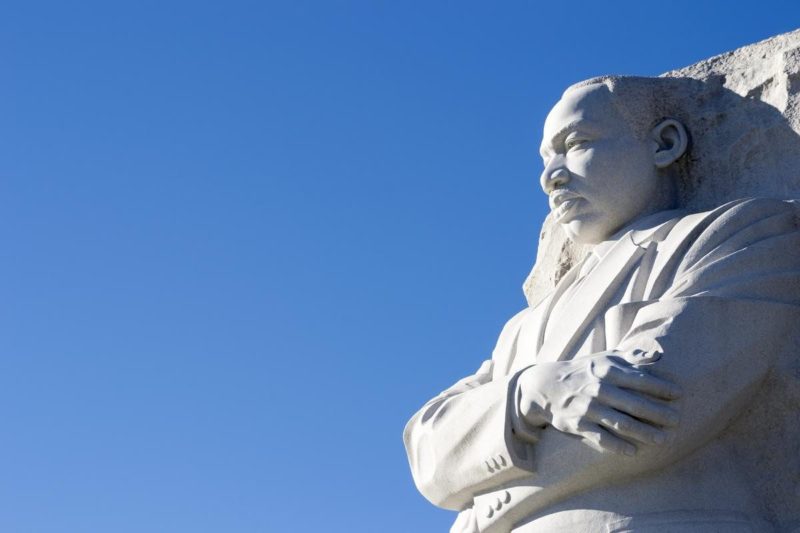Black Activists Turn to Twitter to #ReclaimMLK
The social media event happened just hours after protesters interrupted a breakfast event hosted by Chicago Mayor Rahm Emanuel in honor of the late civil rights leader.

The Chicago-based Black Youth Project 100 (BYP100) hosted a Twitter “power hour” Friday ahead of Martin Luther King Jr. Day using the hashtags #ReclaimMLK and #BuildBlackFutures.
The social media event happened just hours after protesters interrupted a breakfast event hosted by Chicago Mayor Rahm Emanuel in honor of the late civil rights leader. Demonstrators, who had gathered as early as 6 a.m. and later locked arms in a human chain around the entrance of the Hyatt Regency McCormick Place hotel, called out police brutality—an issue that has roiled the city since the release last November of footage showing police officers fatally shooting an unarmed Black teenager.
One woman who stormed the venue Friday morning held a sign in protest, and shouted “16 shots,” a reference to the number of times Officer Jason Van Dyke fired into the body of 17-year-old Laquan McDonald, whose murder was covered up by the police for 13 months.
Emanuel has faced immense pressure since the dashboard video camera footage was released, with scores of Black Lives Matter activists, particularly youth, calling for his resignation.
Those demands continued following the release Thursday of another long-concealed video revealing the police murder of Cedrick Chatman, an unarmed Black 17-year-old. The January 2013 footage shows two Chicago police officers shooting Chatman in the back while he attempts to run away. One officer later steps on the boy’s back while he lies wounded on the ground. What officers claimed to be a “weapon” in the teen’s hand later turned out to be an iPhone cover.
Given that Chicago has one of the highest ratios of police per residents, with more than 450 officers per 100,000 civilians, BYP100 has called for large-scale divestment from the police department, and investment of those funds into opportunities for Black youth, a sentiment that several participants echoed during the Twitter event. A BYP100 chapter in Washington, D.C., has issued a similar demand, claiming that the city spends an annual $500 million on the police but only $200 million on affordable housing.
We demand all local, state and federal budgets to defund the police and invest those $ in Black futures. #ReclaimMLK #BuildBlackFutures
— BYP100 (@BYP_100) January 15, 2016
Others called for the reclamation of MLK’s radical politics, including the use of protest to achieve political ends, and an end to the “Santa Clausification” of the historic Black personality by the mainstream white establishment.
We reject the cookie-cutter, white-washed, ahistorical version of MLK that the media tries to stuff down our throats #ReclaimMLK — Ejike [eh-jih-kāy] (@TheNewThinker) January 15, 2016
To #BuildBlackFutures, and in the spirit of MLK, we gotta confront the state y’all. #ReclaimMLK
— Domo (@hazzardeuce) January 15, 2016
Several tweets from the official account for Fight for 15, an international movement for a $15 minimum wage, called attention to the overrepresentation of Black workers in low-wage jobs, including in the fast food and retail sectors. According to BYP100’s Black Work Matters campaign, 46 percent of Chicago’s Black workers, and a full half of Black workers in New York City, are in low-wage jobs. Such economic disparities have a particularly harsh impact on Black women, who are vastly overrepresented in the low-wage economy and earn just 65.1 percent of the median hourly wage of a working white man.
A6: Admitting that low-income women of color lift this country & without our liberation there is no victory #ReclaimMLK #BuildBlackFutures — Fight For 15 Chicago (@chifightfor15) January 15, 2016
Other major themes that emerged during the hour-long event included the question of reparations for “chattel slavery, Jim Crow, and mass incarceration,” calls to end the school-to-prison pipeline, and the need to center the lives and experiences of Black women and girls, as well as LBGTQ communities, in movement-building work.
To #BuildBlackFutures, we have to embrace the fact that reparations is not an outlandish request. It is an overdue demand. #ReclaimMLK
— Janae E. Bonsu (@JEBonsu) January 15, 2016
To #BuildBlackFutures, we will work toward breaking down barriers that impede access to justice for our Black LGBTQ+ siblings #ReclaimMLK
— Lambda Legal (@LambdaLegal) January 15, 2016
Stop underestimating the capacity of black women black trans folk and black non gender conforming folk. #relclaimmlk #BuildBlackFutures — Mar-see-yuh (@ambitiouswreck) January 15, 2016
Dozens of tweets also saluted MLK’s anti-war legacy, quoting his stance on military spending and radical strategies for economic justice that revolve around investing heavily in schools, libraries, and youth as opposed to foreign wars and defense architecture.
“A nation that continues to spend more on military defense than on social uplift is approaching spiritual death” #ReclaimMLK — Take ‘Em Down NOLA (@takeemdownnola) January 15, 2016

